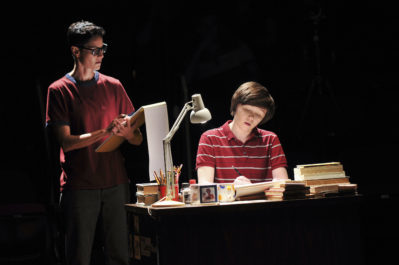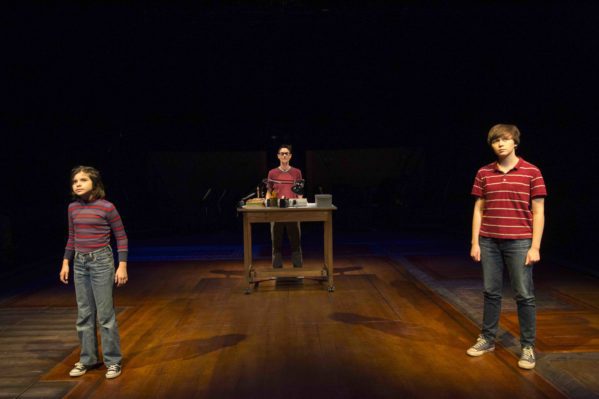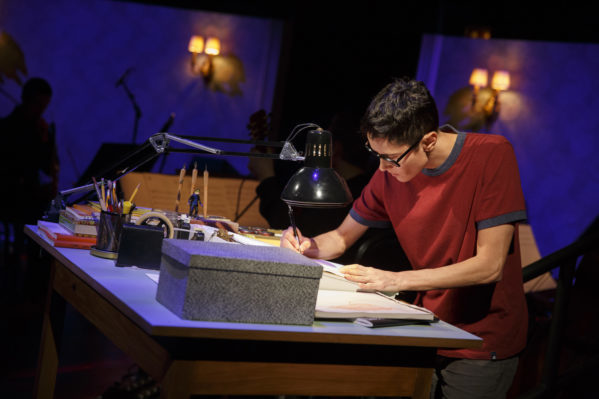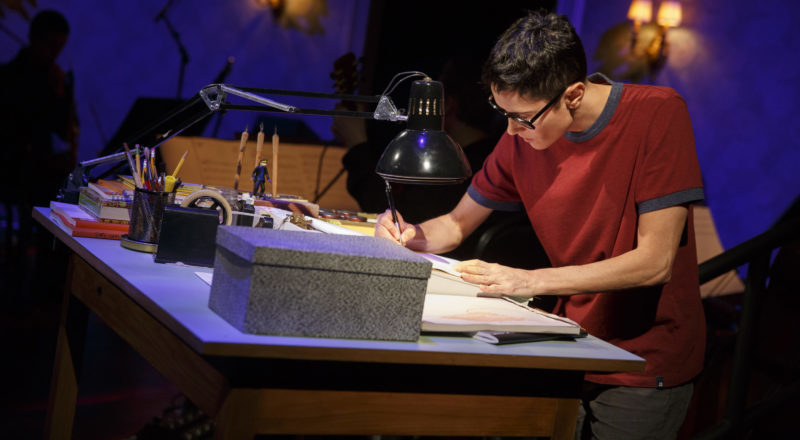INTERVIEW: Beth Malone reflects on her years in ‘Fun Home’

Fun Home, the groundbreaking musical that’s set to close Sept. 10 on Broadway, has paved an important path for itself and other shows in New York City. The 2015 Tony winner for Best Musical is an adaptation of Alison Bechdel’s best-selling graphic memoir, and its finely focused portrait of an American family struggling with issues of identity, acceptance and secrets has struck a chord with critics and audiences alike. Each night, at the center of the stage at the Circle in the Square, is Beth Malone, who plays Alison as an adult cartoonist bringing Fun Home to life. It’s a central, pivotal role that helps the audience understand this family’s triumphs, joys, despair and setbacks.
Speaking before news of the show’s closing, Malone was reflective of her time in Fun Home. She has been part of the musical throughout its formative stages, including at the Sundance Theatre Lab and its run at The Public Theatre.
“I’m trying to sort of savor every moment as we get a year in, and it starts to seem like it’s not going to be a thing that goes on and on and on forever and forever,” Malone said recently in a phone interview. “For a long time there was no end in sight for me because there was always a future production to look to, a future reading. I’ve done a million readings of it, and then there was always something on the calendar — three months down the road or a year down the road. And now we’re like in the middle of its adulthood, let’s say, and the next thing to kind of say is I’ve done everything I wanted to do with Fun Home. And now it is something that I will see in my rearview mirror instead of the front. I try really hard to remember that and to savor it as each performance begins. I think how lucky to be able to tell this story and to be with this group of people who have become family.”
Throughout Malone’s tenure with the show she has had ample time to explore this central character. Alison is a person who came out as gay in her college years but didn’t know that her father was also gay. His secrets affect all of the family members, who join together and help operate a funeral home business (hence the title Fun Home). So as Alison grapples with her new identity and new life, she recognizes the ways in which her story is both similar and different from her father’s story.
To tell this one-act musical, the cast, which also includes Michael Cerveris and Judy Kuhn, bring to life the score of Jeanine Tesoro and the book and lyrics of Lisa Kron. They were directed by Sam Gold. Also on stage with Malone are two younger versions of the Alison character, played by Gabriella Pizzolo as a child and Emily Skeggs as a college student.
The musical is extremely focused on its characters and narrative, and Malone said this was a conscious effort throughout the show’s evolution. “All the fat, anything extraneous was trimmed out of this particular version,” she said. “So it’s just really lean. There’s not a line that happens that doesn’t inform the audience of some intricate and important detail to the furthering of the trajectory of this particular script. It’s all about problem solving, and anything that doesn’t go toward solving that problem was trimmed, including extraneous character development.”

For the audience, it’s interesting to see how this real-life person has been adapted to the stage by a team of writers and actors because at the heart of Fun Home is the craft of writing. Many scenes portray Malone, center stage and standing at an artist’s table, writing captions and drawing cartoons. It’s a simple, startling image, especially for a Broadway stage.
“There’s something very magnetic about it, but it’s not exactly clear why you can’t stop watching her draw,” she said. “It’s like, why is that so engaging? The reason it’s so engaging is because of the need behind it, the very specific, leaned-in drive behind the need to do this, to delve into that box today. It definitely holds up. It’s been a lesson in trusting material, trusting what is watchable and stuff like that.”
The journey that Alison takes in the show is one that the audience follows her on. As she discovers the truths of her father, her mother and the ways of the complicated world outside the insularity of the “fun home,” the audience sees her change and become a person with a new realization of life.
“It’s a very complicated way to write a play,” Malone admitted. “It’s a memory play, but the memories don’t do the same thing, or behave the same way or follow the same rules from moment to moment to moment in the show. And that is not like any memory play that I know of. Memories behave themselves in a very specific way, so the audience feels very comfortable, like Glass Menagerie. … It’s going to tell a story, and he’s going to be within the story. But we know he’s without the story. You tend to buy into this modality, and in Fun Home and many other scripts that Lisa Kron has written, she likes to let you get really comfortable with the things you know and then change the rules on you. That’s what she loves to do actually, especially in that moment when Michael [Cerveris] finally turns to me, and I become not the narrator but the participant in the scene. And he’s actually looking at me and talking to me. That’s a magnificently crafted piece of theatricality that takes a whole evening to build every night, and then to crash it open is just kind of fun.”
Fun Home delves into several important themes, and it wondrously doesn’t fit into any one mold. There is the sense of self-discovery and sexuality. There are family issues and coming-of-age issues. There is the process of coming out to family and friends, and their reactions to such revelations. There is the power of art and the pain of memories. There is joy. There is despair.

“The themes of self-discovery and things like that, it’s almost like there’s been so many pieces of art that have gone before us that sort of did that already,” Malone said. “Someone goes to college. It’s going to be this huge time of growth, but what makes it interesting in Fun Home is how that joyful, joy-filled time in any young person’s life, not just a gay person, but a person who is going off to college for the first time and stretching their legs and discovering their own empowering identity, how for gay people that moment is often paired with despair and shame. And the feeling of shame is ultimately what cripples Bruce [Alison’s father]. … So it’s a complicated, complicated story that isn’t this nice, tidy, self-discovery story. It sort of takes all of those things, all of those stories, good or bad, and allows the audience to feel like yes, yes, we understand you understand this, so let’s talk about what happens beyond the obvious.”
No matter the character development or plot twist in Fun Home, events in the script need to be earned, Malone said. There are rousing production numbers that are enormously satisfying, but they don’t come out of nowhere and don’t have a sole purpose of cookie-cutter entertainment, much like the rest of Broadway fare. Fun Home is centered on single images and their theatrical power.
“The play starts out with a single person entering in silence and beginning to work,” Malone said. “And that’s audacious, and then you have to teach the audience moment by moment by moment how to listen to this play. And the first thing that happens is you hear things. … You’re starting to get an idea of what’s going on here, what’s up in this household. It’s a mystery that unfolds before you.”
Because of its unconventional structure, Malone found the process of creating the musical a “little unnerving.”
“When a song is kind of winding around, and it feels like there should be some ta-da payoff at the end of the opening number, and then I say, ‘Caption, my dad and I both grew up in the same home. And he was gay, and I was gay. And he killed himself, and I became a lesbian cartoonist.’ That doesn’t have any kind of satisfying rhythm,” she said. “It’s just true. That’s all it is. It’s just true, and it just lets the audience know you’re going to have to hold up your end of this bargain. … Trust me it’s going to be worth it. That’s what it’s all about. Sometimes it doesn’t work. There are a few people who are like, ‘Nah, I just like to feel happy, so I just want a good little play that makes me feel happy.’ Well, then you’re going to want to go Something Rotten and have a good time. So there you go, but this is something else that’s going on here. And it’s something important.”
By John Soltes / Publisher / John@HollywoodSoapbox.com
Fun Home is currently playing the Circle in the Square in New York City through Sept. 10. Click here for more information.


One thought on “INTERVIEW: Beth Malone reflects on her years in ‘Fun Home’”